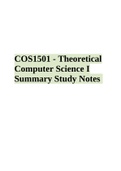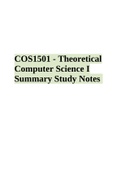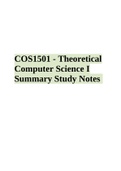COS1501 Theoretical Computer Science I (COS1501)
University of South Africa
All 3 results
Sort by

-
COS1501 - Theoretical Computer Science I Summary Study Notes
- Other • 41 pages • 2022
-
- R75,76
- + learn more
COS1501 - Theoretical Computer Science I Summary Study Notes. The development of number systems: Z + , Z ≥ and Z Positive integers: Z + Z + = {1, 2, 3, …} Law 1-7 Non-negative integers: Z ≥ Z ≥ = {0, 1, 2, 3, …} Law 1-9 Integers: Z Z = {... , -3, -2, -1, 0, 1, 2, …} Law 1-10 (Law 6 is different) and Def 1-3 The Laws for Z+ and Z≥ Law 1 (commutativity): For all non-negative integers m and n, m + n = n + m and mn = nm. Law 2 (associativity): For all non-negativ...

-
COS1501 - Theoretical Computer Science I Summary Study Notes
- Other • 41 pages • 2022
-
- R75,76
- 1x sold
- + learn more
COS1501 - Theoretical Computer Science I Summary Study Notes. A positive integer p greater than 1 is defined to be a prime number if its only factors are 1 and p. Definition 3 (n factorial (n!)): If n is any positive number, then n factorial, denoted by n!, is calculated as follows: n! = n(n–1)(n–2)…(4)(3)(2)(1) Study unit 2 Rational and real numbers: Q and R The rational numbers: Q Set of all numbers of the form p/q where p and q are integers and q is not zero p q where p, q ...

-
COS1501 - Theoretical Computer Science I Summary Study Notes
- Exam (elaborations) • 41 pages • 2022
-
- R66,29
- + learn more
COS1501 - Theoretical Computer Science I Summary Study Notes. Definition 2 (Prime number): A positive integer p greater than 1 is defined to be a prime number if its only factors are 1 and p. Definition 3 (n factorial (n!)): If n is any positive number, then n factorial, denoted by n!, is calculated as follows: n! = n(n–1)(n–2)…(4)(3)(2)(1) Study unit 2 Rational and real numbers: Q and R The rational numbers: Q Set of all numbers of the form p/q where p and q are integers and q i...

Study stress? For sellers on Stuvia, these are actually golden times. KA-CHING! Earn from your study notes too and start uploading now. Discover all about earning on Stuvia


